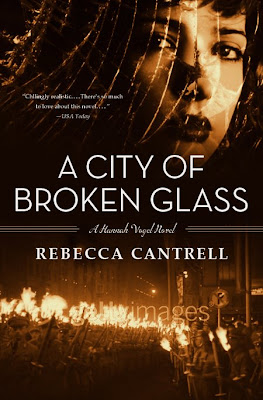A Review of Rebecca Cantrell's A CITY OF BROKEN GLASS
A
CITY OF BROKEN GLASS is the fourth in Rebecca Cantrell's Hannah Vogel series
set in Berlin of the 1930s. In this outing, the year is 1938 and we find Vogel,
a reporter, in Poland to cover an event. With her adopted son in tow, she
stumbles upon a Nazi secret: thousands of Jews of Polish heritage have been
expelled from Germany and are being held by the Polish government in appalling
conditions. Trying to do something about this gets her arrested by the Gestapo
who try to smuggle her across the border. Her old lover, Lars, saves the day
but they are forced to hide out in Berlin while they plan to leave for good.
But
you can't keep the intrepid Vogel down. She wants to know who betrayed her to
the Gestapo while investigating a murder and the case of a missing child. These
plot elements should be the ingredients for a tense thriller that bookends with
the Polish deportations leading Herschel Grynszpan to
assassinate Ernst vom Rath and Krystallnacht which was the result. Sadly,
the novel does not live up to the historical setting.
 A
CITY OF BROKEN GLASS is the second Vogel story I've read. I began with the
first in the series, A TRACE OF SMOKE (to be reviewed here soon) so I came to
the material with some expectations. In picking up the novel, I'd hoped that
between books #1 and #4, the writing would have improved but this is not the
case with A CITY OF BROKEN GLASS. Vogel is still more concerned about her love-triangle
romance and her adopted son than the tide of history and this gets as old in
this offering as it did in the first. The novel is researched but period
details rarely appear in the sparsely written, screenplay like text. History
truly takes a backseat to romantic triangles and motherhood. The title is
misleading as well since Krystallnacht doesn't actually begin until the last 20
or so pages. There is an intriguing murder plot but this is left to the ol'
"sudden revelation" near the end to break the case. Not surprising
really as Vogel's love life is always more important than the rise of Nazism.
A
CITY OF BROKEN GLASS is the second Vogel story I've read. I began with the
first in the series, A TRACE OF SMOKE (to be reviewed here soon) so I came to
the material with some expectations. In picking up the novel, I'd hoped that
between books #1 and #4, the writing would have improved but this is not the
case with A CITY OF BROKEN GLASS. Vogel is still more concerned about her love-triangle
romance and her adopted son than the tide of history and this gets as old in
this offering as it did in the first. The novel is researched but period
details rarely appear in the sparsely written, screenplay like text. History
truly takes a backseat to romantic triangles and motherhood. The title is
misleading as well since Krystallnacht doesn't actually begin until the last 20
or so pages. There is an intriguing murder plot but this is left to the ol'
"sudden revelation" near the end to break the case. Not surprising
really as Vogel's love life is always more important than the rise of Nazism.
No comments:
Post a Comment